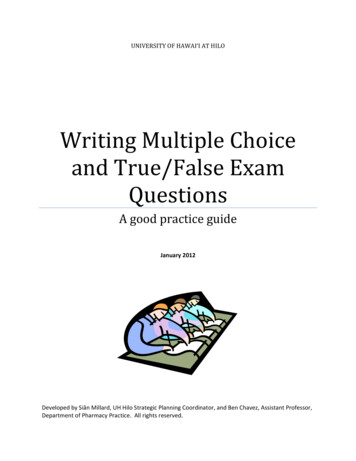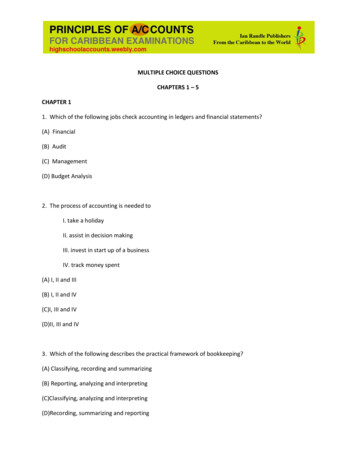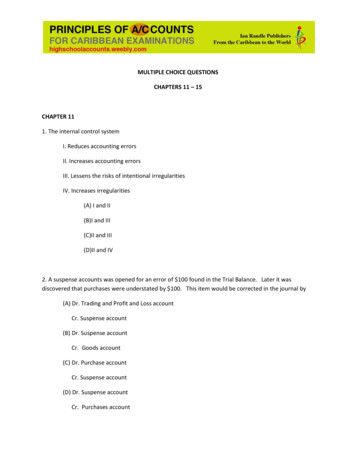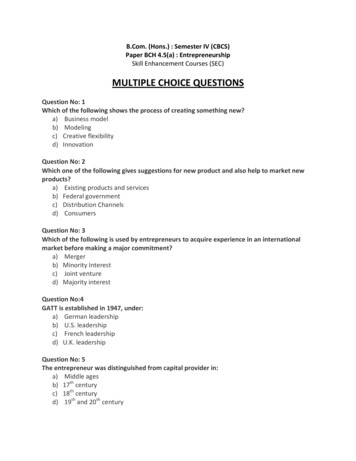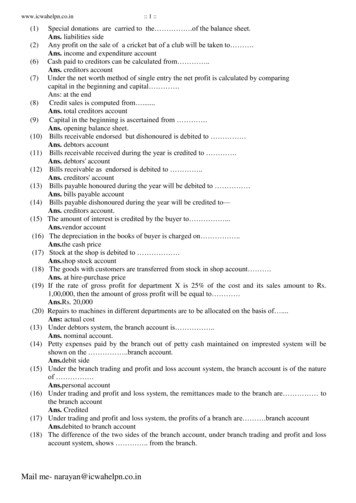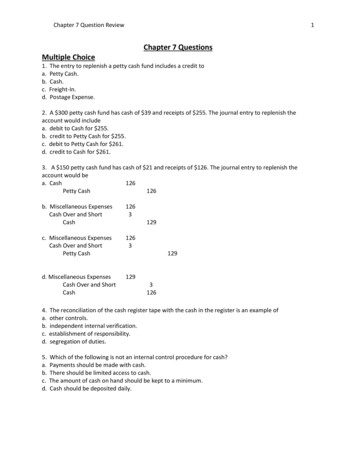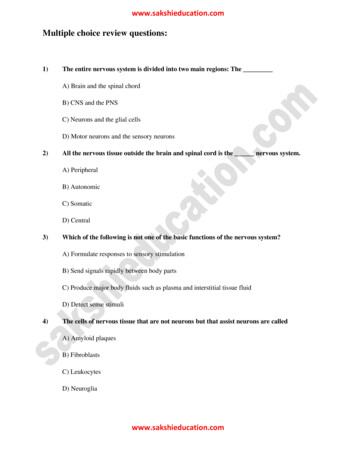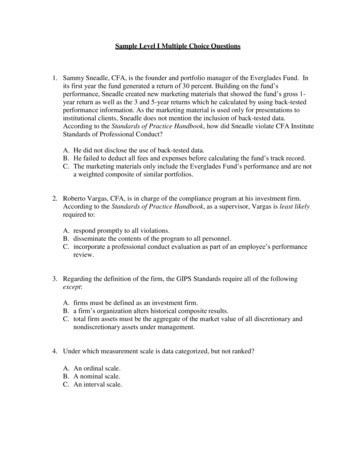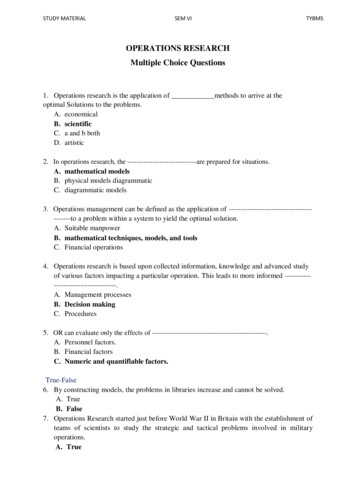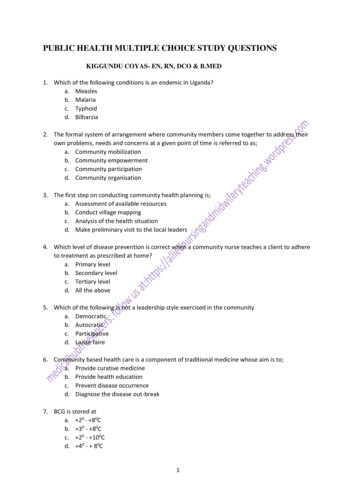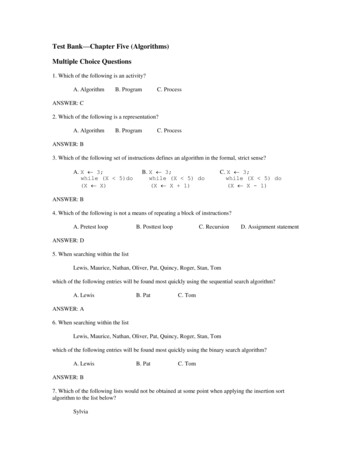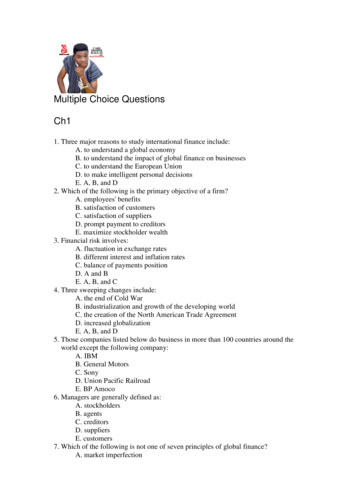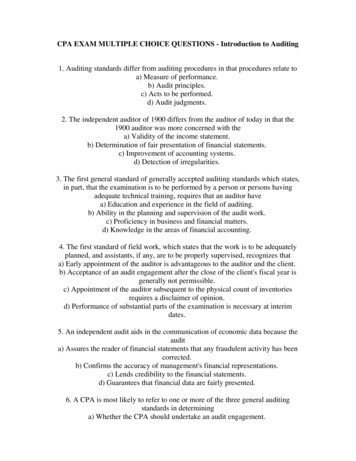
Transcription
CPA EXAM MULTIPLE CHOICE QUESTIONS - Introduction to Auditing1. Auditing standards differ from auditing procedures in that procedures relate toa) Measure of performance.b) Audit principles.c) Acts to be performed.d) Audit judgments.2. The independent auditor of 1900 differs from the auditor of today in that the1900 auditor was more concerned with thea) Validity of the income statement.b) Determination of fair presentation of financial statements.c) Improvement of accounting systems.d) Detection of irregularities.3. The first general standard of generally accepted auditing standards which states,in part, that the examination is to be performed by a person or persons havingadequate technical training, requires that an auditor havea) Education and experience in the field of auditing.b) Ability in the planning and supervision of the audit work.c) Proficiency in business and financial matters.d) Knowledge in the areas of financial accounting.4. The first standard of field work, which states that the work is to be adequatelyplanned, and assistants, if any, are to be properly supervised, recognizes thata) Early appointment of the auditor is advantageous to the auditor and the client.b) Acceptance of an audit engagement after the close of the client's fiscal year isgenerally not permissible.c) Appointment of the auditor subsequent to the physical count of inventoriesrequires a disclaimer of opinion.d) Performance of substantial parts of the examination is necessary at interimdates.5. An independent audit aids in the communication of economic data because theaudita) Assures the reader of financial statements that any fraudulent activity has beencorrected.b) Confirms the accuracy of management's financial representations.c) Lends credibility to the financial statements.d) Guarantees that financial data are fairly presented.6. A CPA is most likely to refer to one or more of the three general auditingstandards in determininga) Whether the CPA should undertake an audit engagement.
b) The nature of the CPA's report qualification.c) The scope of the CPA's auditing procedures.d) Requirements for the review of internal control.7. The first standard of field work recognizes that early appointment of theindependent auditor has many advantages to the auditor and the client. Which ofthe following advantages is least likely to occur as a result of early appointment ofthe auditor?a) The auditor will be able to complete the audit work in less time.b) The auditor will be able to perform the examination more efficiently.c) The auditor will be able to better plan for the observation of the physicalinventories.d) The auditor will be able to plan the audit work so that it may be doneexpeditiously.8. Which of the following best describes the reason why an independent auditorreports on financial statements?a) A management fraud may exist and is more likely to be detected by independentauditors.b) Different interests may exist between the company preparing the statements andthe persons using the statements.c) A misstatement of account balances may exist and is generally corrected as theresult of the independent auditor's work.d) Poorly designed internal control may exist.9. What is the general character of the three generally accepted auditing standardclassified as general standards?a) Criteria for content of the F/S and the auditor's report.b) Criteria of audit planning and supervision and evidence gathering.c) The need to maintain an independence in mental attitude in all matters relatingto the assignments.d) Criteria for competence, independence and professional care of individualsperforming the audit.10. A CPA, while performing an audit, strives to achieve independence inappearance in order toa) Reduce risk and liability.b) Comply with the generally accepted standards of field work.c) Become independent in fact.d) Maintain public confidence in the profession.11. The "generally accepted auditing standards" are standards whicha) Are sufficiently established so that independent auditors generally agree on theirexistence.
b) Are generally accepted based upon a pronouncement of the FinancialAccounting Standards Board.c) Are generally accepted in response to the changing needs of the businesscommunity.d) Are generally accepted as a consequence of approval of the AICPAmembership.12. The primary objective of the ordinary examination of financial statement by aCPA is the expression of an opinion ona) The competence of management in accounting matters which is implied bywhether the opinion is qualified or not.b) The conformity of the statements with the book of account.c) The conformity of the financial statements with generally accepted auditingstandards applied on a basis consistent with that of the prior year.d) The fairness with which the financial statements present cash flows and resultsof operations.13. The primary responsibility for the adequacy of disclosure in the financialstatements of a publicly held company rests with thea) Partner assigned to the engagement.b) Auditor in charge of field work.c) Management of the company.d) Securities & Exchange Commission.14. A CPA should comply with applicable GAAS on every engagementa) Without exception.b) Except in examinations that result in a qualified report.c) Except in engagements where the CPA is associated with unaudited F/S.d) Except in examinations of interim financial statements.15. Which of the following best describes what is meant by GAAS?a) Audit objectives generally determined on audit engagements.b) Acts to be performed by the auditor.c) Measures of the quality of the auditor's performance.d) Procedures to be used to gather evidence to support financial statements.16. The first general standard recognizes that regardless of how capable anindividual may be in other fields, the individual can not meet the requirements ofthe auditing standards without the propera) Business and finance course.b) Quality control and peer review.c) Education & experience in auditing.d) Supervision and review skills.
17. The first general standard requires that the examination of F/S is to beperformed by a person having adequate technical training anda) Independence with respect to the F/S and supplementary disclosures.b) Exercising professional care as judged by peer reviewers.c) Proficiency as an auditor which likely has been acquired from previousexperience.d) Objectivity as an auditor as verified by proper supervision.18. Due professional care requiresa) A critical review of the work done at every level of supervision.b) The examination of all corroborating evidence available.c) The exercise of error free judgment.d) A study and review of the I/C's that include tests of controls19. The third general standard states that due care is to be exercised in theperformance of the examination. This standard means that a CPA who undertakesan engagement assumes a duty to perform each audita) As a professional possessing the degree of skill commonly possessed by othersin the field.b) In conformity with generally accepted accounting principles.c) With reasonable diligence and without fault or error.d) To the satisfaction of governmental agencies and investors who rely upon theaudit.20. According to court decision, GAAS established by the AICPA appliesa) Only to AICPA members.b) To all CPA's.c) Only to those who choose to follow them.d) Only when conducting audits subject to the AICPA jurisdiction.21. Which of the following best describes the reason why an independent auditorreports on financial statements?a) A management fraud may exist and is more likely to be detected by independentauditors.b) Different interests may exist between the company preparing the statements andthe persons using the statements.c) A misstatement of account balances may exist and is generally corrected as theresult of the independent auditor's work.d) Poorly designed internal control may exist.(Yes, this is the same as #8, ask me why!!!)22. The independent audit is important to readers of F/S because ita) Determines the future stewardship of the management of the company whosefinancial statements are audited.
b) Measures and communicates financial and business data in the F/S.c) Involves the objective examination of, and reporting on, management-preparedstatements.d) Reports on the accuracy of all information in the F/S.23. Independent auditing can best be described asa) A branch of accounting.b) A discipline that attests to the results of accounting and other functionaloperations and data.c) A professional activity that measures and communicates financial and businessdata.d) A regulatory function that prevents the issuance of improper financialinformation.24. What is the meaning of the GAAS that requires the auditor to be independent?a) The auditor must be without bias with respect to the client under audit.b) The auditor must adopt a critical attitude during the audit.c) The auditor's sole obligation is to third parties.d) The auditor may have a direct ownership interest in the client's business if it isnot material.25. The primary purpose of a management advisory services engagement is to helpthe clienta) Become more profitable by relying upon the CPA's existing personal knowledgeabout the client's business.b) Improve the use of its capabilities and resources to achieve its objectives.c) Document and quantify its future plans without impairing the CPA's objectivityor allowing the CPA to assume the role of management.d) Obtain benefits that are guaranteed implicitly by the CPA.26. Operational auditing is primarily oriented towarda) Future improvements to accomplish the goals of management.b) The accuracy of data reflected in management's financial records.c) The verification that a company's financial statements are fairly presented.d) Past protection provided by existing internal control.27. Because an examination i/a/w GAAS is influenced by the possibility ofmaterial errors, the auditor should conduct the examination with an attitude ofa) Professional responsiveness.b) Conservative advocacy.c) Objective judgment.d) Professional skepticism.28. The exercise of due professional care requires that an auditor
a) Use error-free judgment.b) Consider the internal control structure, including tests of controls.c) Critically review the work done at every level of supervision.d) Examine all corroborating evidence available.29. CPA firms should establish quality control policies and procedures forpersonnel management in order to provide reasonable assurance thata) Employees promoted possess the appropriate characteristics to performcompetently.b) Personnel will have the knowledge required to fulfill responsibilities assigned.c) The extent of supervision and review in a given instance will be appropriate.d) All of the above are reasons.30. The least important evidence of a CPA firm's evaluation of its system of QCwould concern the CPA firm's policies and procedures fora) Employment (hiring).b) Confidentiality of audit engagements.c) Assigning personnel to audit engagements.d) Determination of audit fees.31. A CPA establishes QC policies and procedures for deciding whether to accepta new client or continue to perform services for a current client. The primarypurpose for establishing such policies is toa) Enable the auditor to attest to the integrity or reliability of a client.b) Comply with the quality control standards established by regulatory bodies.c) Minimize the likelihood of association with clients whose management lacksintegrity.d) To lessen the exposure to litigation resulting from failure to detect irregularitiesin client financial statements.32. In pursuing its quality control objectives with respect to acceptance of a client,a CPA firm is not likely toa) Make inquiries of the proposed client's legal counsel.b) Review financial statements of the proposed client.c) Make inquiries of previous auditors.d) Review the personnel practices of the proposed client.33. Within the context of quality control, the primary purpose of continuingprofessional education and training activities is to enable a CPA firm to providepersonnel within the firm witha) Technical training that assures proficiency as an auditor.b) Professional education that is required in order to perform with due professionalcare.c) Knowledge required to fulfill assigned responsibilities and to progress within the
firm.d) Knowledge required in order to perform a peer review.34. In pursuing a CPA firms' quality control objectives, a CPA firm may maintainrecords indicating which partners or employees of the CPA firm were previouslyemployed by the CPA firm's clients. Which quality control objective would this bemost likely to satisfy?a) Acceptance of client.b) Supervision.c) Independence.d) Monitoring.35. In pursuing its quality control objectives with respect to independence, a CPAfirm may use policies and procedures such asa) Emphasizing independence of mental attitude in firm training programs and insupervision and review of work.b) Prohibiting employees from owning stock of public companies.c) Suggesting that employees conduct their banking transactions with banks that donot maintain accounts with client firms.d) Assigning employees who may lack independence to research positions that donot require participation in field audit work.36. Which of the following is an element of quality control?a) Supervisionb) Inspectionc) Personnel managementd) Consultation37. In connection with the element of monitoring, a CPA firm's system of qualitycontrol should ordinarily provide for the maintenance ofa) A file of minutes of staff meetings.b) Updated personnel files.c) Documentation to demonstrate compliance with its policies and procedures.d) Documentation to demonstrate compliance with peer review directives.38. One element of the personnel management quality control standard isprofessional development. The primary reason why a CPA firm establishes policiesand procedures for profess
CPA EXAM MULTIPLE CHOICE QUESTIONS - Introduction to Auditing 1. Auditing standards differ from auditing procedures in that procedures relate to a) Measure of File Size: 286KBPage Count: 63Explore furtherAuditing – Multiple Choice Questions (MCQs) and Answers g-Answer-Key.pdf .www.scribd.com(DOC) Auditing Theory Reviewer Jollie Vi - Academia.eduwww.academia.eduPRTC - AT2 - Fundamentals of Auditing and Assurance .www.scribd.com(DOC) Audit Theory Quiz 1 Reychelle Arimado - Academia.eduwww.academia.eduRecommended to you based on what's popular Feedback
